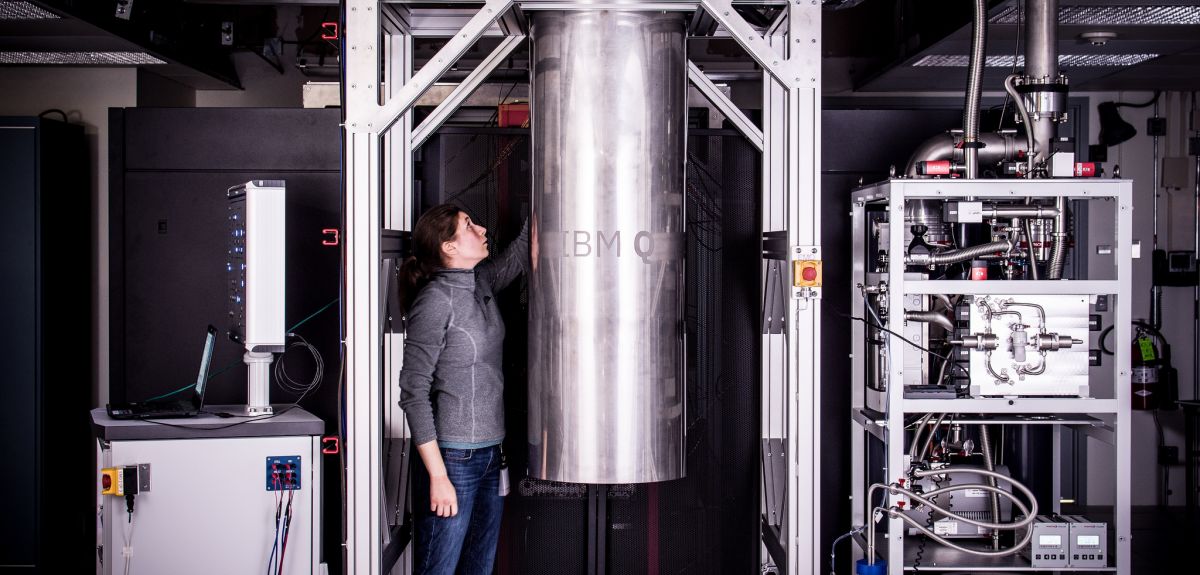
IBM Research Staff Member Katie Pooley, an Applied Physics PhD from Harvard who joined IBM in 2015, at the Thomas J Watson Research Center, is a process integrator on the IBM Q team. In the photo, Pooley is examining a cryostat with the new prototype of a commercial quantum processor inside.
Oxford Becomes UK Partner in IBM’s Quantum Computing Network
International Business Machine Corp (IBM) has today announced the University of Oxford as one of the first clients to use their early-access, commercial quantum computing network.
As part of a select group of global leaders, Oxford University will be an initial member of the newly formed IBM Q Network. A collaboration of leading Fortune 500 companies, academic institutions and national research labs, the group will work directly with IBM to explore potential practical applications for their quantum computing systems.
While too little is known about quantum information technologies at this stage to enable tangible improvements, the field has the potential to help users to solve problems that are completely impenetrable on conventional supercomputers. Long-term projections suggest that these technologies could bring about game-changing developments, allowing users to understand and predict the properties of complex systems like advanced new materials or drugs.
Oxford and IBM are both dedicating considerable resources to the field, developing both hardware and software solutions for research and commercial applications.
This new collaboration will be led at Oxford by the Networked Quantum Information Technologies (NQIT) Hub, a consortium of UK universities and industry partners representing world-leading research in quantum computing, supported by the Engineering and Physical Sciences Research Council (EPSRC).
As a result of the collaboration, Oxford will serve as the IBM Q Network Hub in the UK, supporting others in using the systems and collaborating with companies and other universities on existing NQIT and Oxford research into quantum computing developments. This places NQIT and Oxford at the centre of the burgeoning quantum technology industry in the UK.
Alongside this project, NQIT is developing its own quantum computer based on an innovative networked hybrid light-matter approach. This development is part of a national effort to position the UK as a leader in the challenge of developing software and algorithms for quantum computers. The long term goal of the project is to demonstrate the new and unique capabilities of the technology in areas such as medicine, transport, engineering, finance, materials and chemistry.
Professor Ian Walmsley, Hooke Professor of Experimental Physics, Director of the Networked Quantum Information Technologies (NQIT) Hub and Pro-Vice-Chancellor for Research and Innovation, said: ‘I am delighted with this new partnership with IBM. Working with one of the world's leading information technology companies to develop new applications for a quantum computer will enhance Oxford’s and the UK’s capability in quantum technology, by providing a unique resource for the Oxford-led Networked Quantum Information Technologies Hub. NQIT’s emulator programme will work with IBM to convene scientists, engineers and industrial researchers and developers across a wider range of fields, from simulating new molecules to enhancing artificial intelligence to show how quantum computers can dramatically transform their ideas and businesses.’
 Statins do not cause the majority of side effects listed in package leaflets
Statins do not cause the majority of side effects listed in package leaflets
 Activism proves a stimulating topic at Sheldonian Series event
Activism proves a stimulating topic at Sheldonian Series event